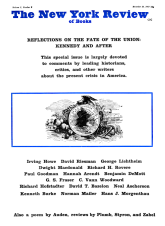Was this “the loudest shot since Sarajevo”—as a BBC commentator, stunned by impact of the news, said? Does this shot mean that the brief “moment of comparative calm” and “rising hope,” of which the dead President spoke only two months ago in an address to the United Nations, will soon be over? Will the day come when we are forced to see in this tragedy a historical turning-point? To think in terms of comparisons, to apply historical categories to contemporary events is tempting, for to anticipate the future historian is to escape the terrible reality and naked horror of a tragedy that is only too present. And it is misleading; for the future, which depends upon ourselves and our contemporaries, is unpredictable, and history begins only when the story it has to tell us has come to its end.
At this moment when we have been reassured of the continuity of American policy both on the domestic and the international plane, it appears that the country, far from entering a new era, is falling back into its old fold. Unlike Mr. Truman, the new President was not merely Kennedy’s running mate, he was a candidate for the Presidency, and his chances were good if it had not been for the rather novel and unexpected qualities of the Senator from Massachusetts. Time and again during these short days it has been stressed that everything will go on just as before—except that it will be done in a different style.
It was the style of everything he said and did which made this administration so strikingly different—different not in its formulation or pursuit of American policies, but rather in its estimation of politics as such. No doubt, John F. Kennedy thought of politics in what looks at first glance as some what old-fashioned terms, the terms of honor and glory, and the inescapable, highly welcome challenge his generation and his country had been destined to meet. But he was not old-fashioned, and never even tried to “rise above politics,” to evade the fierce competitive power struggle which is the essence of party politics. He did not encourage the image of a “great man,” waiting to be “drafted” into a position he did not seek. He went after the job, knowing its dangers and its awe-inspiring, solitary responsibility, because it was to him the most desirable thing on earth. He was impatient with convention and protocol because they tended to raise him so high above the common rank of men that he could no longer remain what he intended to be—primus inter pares.
It was this style which elevated politics, as has been said before, to a new, higher level, bestowed upon the whole sphere of government a new prestige and a new dignity. The first conspicuous sign of his intentions came as early as the inauguration when he invited many eminent people in the notoriously “unpolitical” fields of the arts and letters. He did not mean to use these poets and artists, musicians, and scholars for any narrowly defined political purpose; and I suspect he did not even want, at least not primarily, to make room in the public realm for those who traditionally and conventionally were most alienated from it. It was the other way round; he wanted them to bring splendor and excellence into public affairs which, left to themselves, can only rarely in times of crisis and emergency, shine by their own intrinsic merits. He looked upon the arts and letters with the eyes of the statesman, and not with the eyes of an “intellectual” who, Hamlet-like, feels that his sensibilities may make him unfit for the demands of action and decision.
The spirit which informed and controlled him has been called the spirit of youth (surely not a matter of years, for this never would have been said of Mr. Nixon who is barely three years older). It was the spirit of a very modern man, a completely “contemporary man.” as Mr. Stevenson so justly called him. Twice in this century, after the First World War and after the Second, the new generation failed to make its voice heard in the public affairs of its respective countries. Kennedy was perhaps the first modern man in high position to do so. But if his was the voice of youth and of the 1960’s, it was all the more remarkable that all his words and actions displayed the highest virtues of the statesman—moderation and insight. Most conspicuous in his handling of the Cuba crisis and the civil rights conflict were the extremes to which he did not go. He never lost sight of the thinking of his opponents, and so long as their position itself was not extreme, and hence dangerous to what he felt were the interests of this country, he did not attempt to rule it out, even though he might have to overrule it. It was in this spirit, which derived from his ability to grasp his opponents’ thinking, that he greeted the student demonstration which picketed the White House after he had decided to resume nuclear testing.
Advertisement
There is a curious and infinitely sad resemblance between the death of the two greatest men we have lost during this year—the one very old, the other in the prime of life. Both the late Pope and the late President died much too soon in view of the work they initiated and left unfinished. The whole world changed and darkened when their voices fell silent. And yet the world will never be as it was before they spoke and acted in it.
This Issue
December 26, 1963



